








April 13th, 2006 - Post No. 53
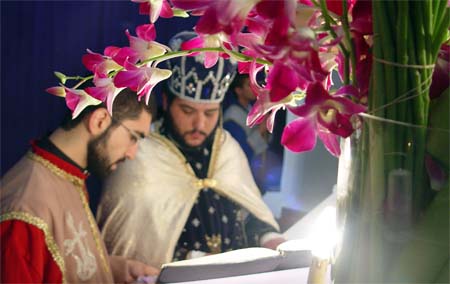
Great Thursday is the fullest day in the Armenian Orthodox liturgical year. Three major services today, and the first is the morning Badarak (Divine Liturgy) commemorating the institution, at the last supper, of the Communion of bread and wine as the central sacrament of Christian life.
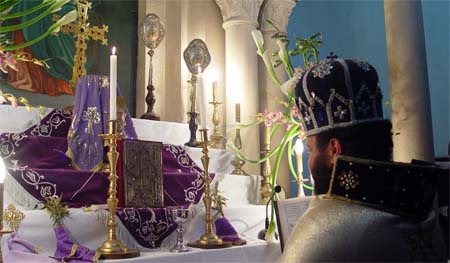
Fr. Ananya is the celebrant, and because there are many hours of
worship to come this day, the Badarak is condensed to its most basic
(with parts of the liturgy said rather than sung) and takes only a bit more than an hour to complete. At the centre of the Badarak,
the consecration of the elements of bread and wine as the Body and Blood
of Christ, with Our Lord's request on the day before he died, "This do
in remembrance of me."
only a bit more than an hour to complete. At the centre of the Badarak,
the consecration of the elements of bread and wine as the Body and Blood
of Christ, with Our Lord's request on the day before he died, "This do
in remembrance of me."
The seminarians have come down from Bickfaya to spend the entire day at the Catholicosate -- when all is said and done, they will sing for eight hours of services today, so they take some time between the morning and afternoon services to relax and enjoy the weather on what is a beautiful day.
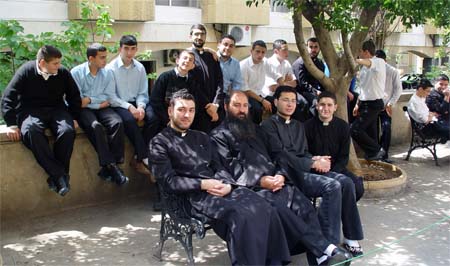
The second service of the day is the Foot Washing ceremony. The service turns around the story reported in John's Gospel (13.1-17) of a truly remarkable gesture Our Lord makes while at supper with his friends, the night before his death on the cross.
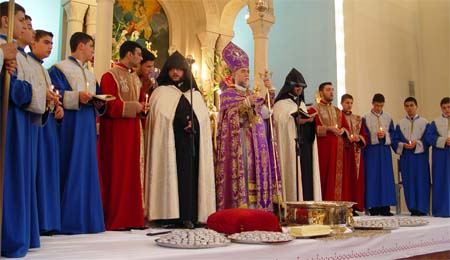
It is the Catholicos who presides at this liturgy, and this is the first time since my arrival three months ago that I have seen his Holiness in his Eucharistic vestments. On either side of the Catholicos stand clergy and seminarians to represent the twelve apostles and have their feet washed. The floor of the sanctuary is covered with a very large embroider linen cloth for the liturgy.
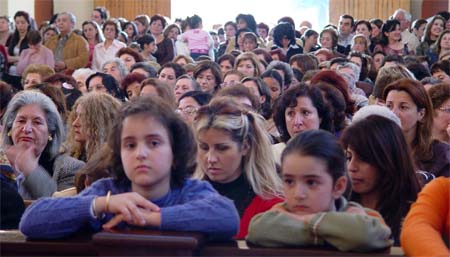
A sizeable congregation gathers for the foot washing -- women and
children for the most part and there is standing room only by the time
the service begins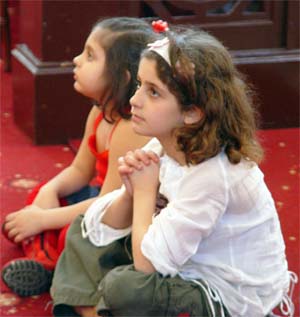 .
.
The children are encouraged to come forward and follow the action from the floor of the lower sanctuary, called the Tas, an area normally reserved for the clergy.
This is the second service this week (Palm Sunday, the other) that reserves a large place for children, and they certainly do seem caught up in the action of the story played out in this afternoon's service.
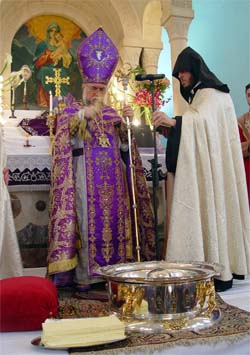 Now
before the festival of the Passover, Jesus knew that his hour had come
to depart from this world and go to the Father. Having loved his own who
were in the world, he loved them to the end.
... And during supper
Jesus, knowing that the Father had given all things into his
hands, and that he had come from God and was going to God,
got up from the table,
took off his outer robe, and tied a towel around himself.
Then he poured water into a basin and began to wash the
disciples’ feet and to wipe them with the towel that was tied around
him.
Now
before the festival of the Passover, Jesus knew that his hour had come
to depart from this world and go to the Father. Having loved his own who
were in the world, he loved them to the end.
... And during supper
Jesus, knowing that the Father had given all things into his
hands, and that he had come from God and was going to God,
got up from the table,
took off his outer robe, and tied a towel around himself.
Then he poured water into a basin and began to wash the
disciples’ feet and to wipe them with the towel that was tied around
him.
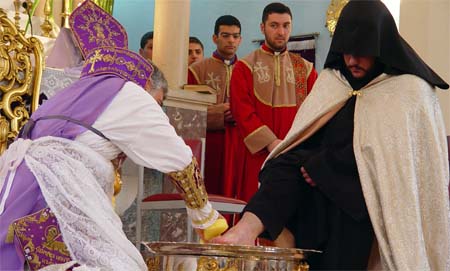
He came to Simon Peter, who said to him, ‘Lord, are you going to wash my feet?’ Jesus answered, ‘You do not know now what I am doing, but later you will understand.’ Peter said to him, ‘You will never wash my feet.’ Jesus answered, ‘Unless I wash you, you have no share with me.’ Simon Peter said to him, ‘Lord, not my feet only but also my hands and my head!’ Jesus said to him, ‘One who has bathed does not need to wash, except for the feet, but is entirely clean. And you are clean, though not all of you.’ For he knew who was to betray him; for this reason he said, ‘Not all of you are clean.’

Butter is blessed with the water at this service, and once the foot is washed, his Holiness anoints the foot with some of the butter. Smaller restaurant cups of butter are distributed to those attending the service.
Fr. Magar explains later that it is a tradition that the seminarian who has had his foot washed, will not wash his foot again for three days. His classmates help him collect flowers on Great Friday, to make flower perfumed water to use when for the washing at the end of the three days.
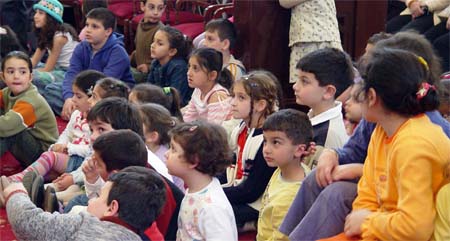
The audience is most impressed with what is going on before their very eyes: his Holiness, down on his feet washing feet! Click here to see a short movie (8MB) of the washing and anointing.
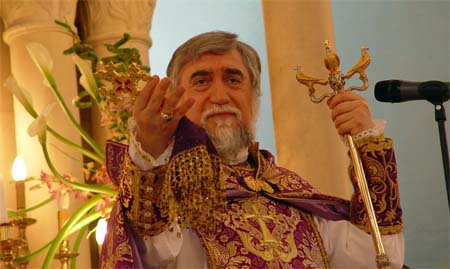
After he had washed their feet, had put on his robe, and had returned to the table, he said to them, ‘Do you know what I have done to you? You call me Teacher and Lord—and you are right, for that is what I am. So if I, your Lord and Teacher, have washed your feet, you also ought to wash one another’s feet. For I have set you an example, that you also should do as I have done to you. Very truly, I tell you, servants are not greater than their master, nor are messengers greater than the one who sent them. If you know these things, you are blessed if you do them.
After reading the final portion of the Gospel narrative, his Holiness addresses the congregation, as Our Lord did once nearly 2000 years ago. Bishop Ardavazt, my pew mate, tells me that the message is "tout autour du mot 'amour.'" (All around the word "love".)
And with this renewal of the mandate to "love one another as I have loved you", the second service of the day draws to an end.
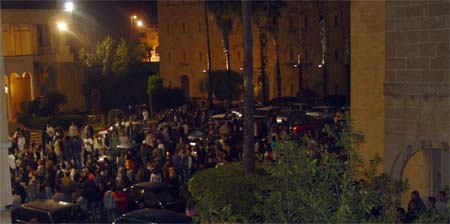
This evening the Catholicosate welcomes possibly the largest congregation of the year for the Great Thursday evening service commemoration Our Lord's "Agony in the Garden." This is the longest service of the day, during which seven passages from the passion narratives are read, each set in a rich decor of ancient chant and hymnody.
With the reading of each of the seven Gospel readings, two of fourteen candels are extinguished and the faithful tie eventually seven knots on strings that they have brought along for the service -- most bring several strings, tying knots for absent friends and family -- these knotted threads are then worn as bracelets throughout the 40 days of Easter.
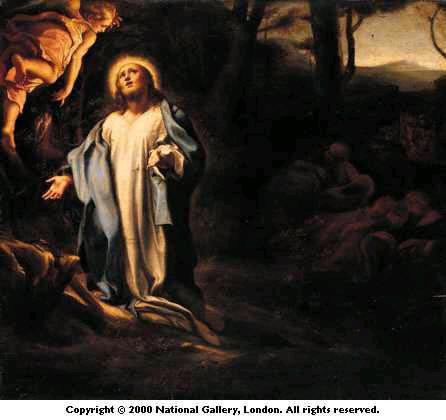
Toward the end of tonight's service Fr. Krikor and Fr. Norayr sing one of the Armenian liturgy's most beautiful laments, Jesus calling for his mother from the cross. Click here to listen to this as sung here tonight, with all of the lights put out, a moment considered by many, to be the most powerful in all of the Holy Week.